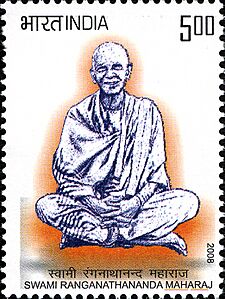Ranganathananda facts for kids
Quick facts for kids Swami Ranganathananda |
|
|---|---|

Ranganathananda on a 2008 Indian stamp
|
|
| Birth Date | 15 December 1908 Trichur, Kerala, British India |
| Died on | 25 April 2005 (aged 96) Woodlands Medical Centre, Kolkata, West Bengal, India |
| Birth name | Shankaran Kutty |
| Guru/teacher | Shivananda |
| Philosophy | Vedanta |
Swami Ranganathananda (born Shankaran Kutty, 1908-2005) was an important Hindu monk. He belonged to the Ramakrishna Math and Mission. He became the 13th president of this spiritual organization. He was known for his wisdom and for sharing Indian spiritual ideas with the world.
Contents
Swami Ranganathananda's Life Journey
Swami Ranganathananda was born on December 15, 1908. His birth name was Shankaran Kutty. He grew up in a village called Trikkur, near Trichur in Kerala, India. As a teenager, he was inspired by the teachings of Swami Vivekananda and Ramakrishna.
Joining the Ramakrishna Order
In 1926, at age 18, he joined the Ramakrishna Order. He became a Brahmachari, which is a spiritual student. He spent nine years at the Mysore center and three years at the Bangalore center. In 1933, he became a Sannyasi, or a monk. This happened on Swami Vivekananda's 70th birthday. His spiritual teacher was Shivananda, who was a direct student of Ramakrishna.
Work and Travels
From 1939 to 1942, Swami Ranganathananda worked in Rangoon (now Yangon, Myanmar). He was the secretary and librarian there. During World War II, Japan bombed Burma. The center had to close. Swami Ranganathananda chose to walk back to India. He trekked with thousands of other people.
From 1942 to 1948, he led the Ramakrishna Math center in Karachi. This was before the partition of India. The mission later found it hard to continue its work there. In Karachi, he met L.K. Advani, who later became a famous politician. Advani said Swami Ranganathananda greatly influenced him. It is also said that Mohammed Ali Jinnah, the founder of Pakistan, once heard him speak about Islam. Jinnah reportedly said, "Now I know how a true Muslim should be."
Leadership Roles and Contributions
After Karachi, Swami Ranganathananda served in different important roles. From 1949 to 1962, he was a secretary at the Delhi center. Then, from 1962 to 1967, he worked at the Ramakrishna Mission Institute of Culture in Kolkata. He directed a school there and edited the mission's monthly magazine.
In 1973, he became the president of the Hyderabad branch. There, he helped create a language school, a temple, and a library. In 1988, he was chosen as the vice-president of the Ramakrishna Math and Mission. Finally, in 1998, he became the president of the entire mission.
Awards and Recognition
The Indian government offered Swami Ranganathananda the Padma Vibhushan award in 2000. This is a very high honor. However, he politely declined it. He said he would only accept awards given to the Ramakrishna Mission, not to him personally.
He did accept two other awards for the Ramakrishna Mission. These were the Indira Gandhi Award for National Integration in 1987 and the Gandhi Peace Prize in 1999.
Teaching and Public Speaking
Swami Ranganathananda was a very popular teacher and speaker. He taught about Indian spiritual culture. By the mid-1950s, he was known across India for his practical teachings. From the 1960s, he traveled almost every year. He gave lectures in Europe, the United States, Australia, Singapore, Iran, and the Soviet Union. He was known for connecting science with spiritual ideas.
He wrote over 50 books. Many of these were published by the Bharatiya Vidya Bhavan. His famous books include Eternal Values for a Changing Society. He also wrote detailed explanations of the Bhagavad Gita and Upanishads. People loved his weekly classes and public talks. He always emphasized a universal religion that accepts everyone.
Swami Ranganathananda also did a lot of social work. He taught moral and religious classes to prisoners in Bangalore and Mysore jails. In Delhi, he helped organize services at hospitals. He also worked to help people with leprosy. Manmohan Singh, a former Prime Minister of India, called him a leader with a "modern mind and scientific temper."
Later Life and Legacy
Swami Ranganathananda spent his last years at the Ramakrishna Mission headquarters in Belur, West Bengal. He passed away on April 25, 2005, in Kolkata, at the age of 96. His body was displayed at Belur Math for people to pay their respects. He was cremated the next day.
In December 2008, India Post released a postage stamp. It had a value of Rs 5. This stamp honored Swami Ranganathananda on his 100th birth anniversary. His life and work have been written about in many books.

